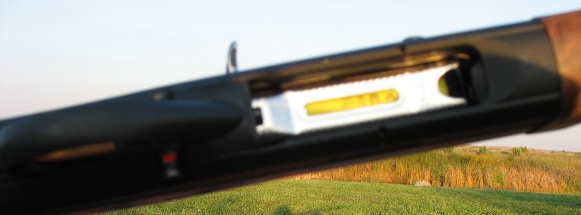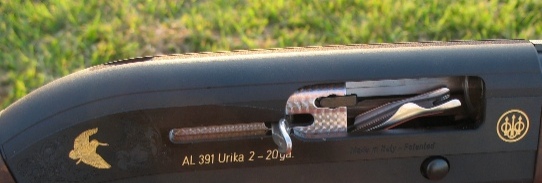What is Better, a Gas-Operated or a Recoil-Operated Autoloading Shotgun?
This is one of those questions that won't go away easily. It isn't helped by the nonsensical statements from gun companies. Anytime you hear that something is better, “PERIOD,” it should set off a few alarm bells, for that is yet another assertion without evidence. Beretta, as most are aware, owns several shotgun brands. Among them are Benelli, Franchi, and Stoeger . . . all part of Beretta. Yet, according to Beretta, you get this.

The claim by Beretta is that a gas-operated shotgun is more reliable, period. Yet, for some reason you won't hear that Beretta's Franchi, Benelli, or Stoeger models are not reliable... at least not from Beretta. Beretta's nut-job explanation is that “energy” in a recoil-operated (inertia) gun is used in one burst, “giving the firearm only one chance to work properly.” It isn't like a gas-operated firearm stores up energy over a week, and then disperses it when you need it, or that shotshells go bang more than once when used in a gas-operated shotgun. Pistols used by everyone around the world are generally recoil-operated. Beretta is either insane for making this statement, or they are just liars. My opinion is that they are not insane.
Are recoil-operated pistols now unreliable, as they are condemned to use their energy in one burst as well? Has Beretta recklessly endangered the lives of the American military by providing them with the one-burst wonder Beretta M9, the recoil-operated handgun horror that it is?
This all will come as a great surprise to the 3,000,000 plus folks who have found the John M. Browning Automatic-Five recoil-operated semi-automatic shotgun to be boringly reliable over the course of their lifetimes, and millions more who have enjoyed the boring reliability of the Remington Model 11 and numerous other models made under license, or made after the Browning patents had run.



This
new Beretta AL391 Urika 2 twenty gauge that I attempted to review was
hardly reliable just because it was a gas gun. It wasn't reliable at
all with much of anything.
The intrinsic, innate, miraculous reliability of the gas gun will also be a big surprise to the victims of broken gas pistons and bad buffers of the Beretta AL391 that were ignored during the poor, inadequate initial testing of the gun, and the infamous shell carrier issues that never have been resolved in that model to date.
No autoloader is completely immune to neglect, lack of very basic maintenance, and using the ammunition it was designed to work with, regardless of action. Nor are any firearms, for that matter, as frustrated owners of doubling O/U shotguns, O/U shotguns that don't always cock both barrels, O/U shotguns with quickly eroded firing pins and the like have long been well aware of. That is no one's version of complete reliability.
There
is no black and white answer, for the best long recoil, inertia, and
gas-operated autoloaders are all quite reliable, assuming proper
ammunition and proper, normal maintenance. Conversely, there are plenty
of one-shot wonders regardless of action type as well.
Despite the obnoxious, self-serving lies published by Beretta and other gun companies, action type has nothing to do with reliability. A good quality recoil-operated Automatic-Five, used with the proper ammunition, is absolutely perfectly reliable. A good quality Bruno Civolani (inertia) type of recoil-operated shotgun, used with the proper ammunition, is perfectly reliable. A good quality gas-operated autoloading shotgun is also absolutely, perfectly reliable when used with the proper ammunition.
Poor or poorly maintained shotguns, poorly designed or erratically manufactured shotguns, or shotguns used with incorrect ammunition are not reliable at all, regardless of action type.
Copyright 2017 by Randy Wakeman. All Rights Reserved.











